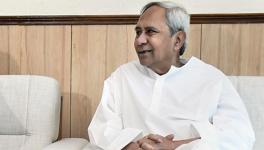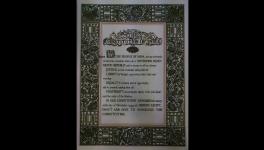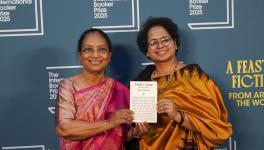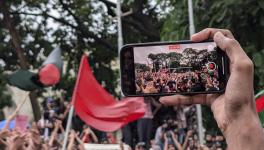Writing in Troubled Times: Reflections of an Indian Writer
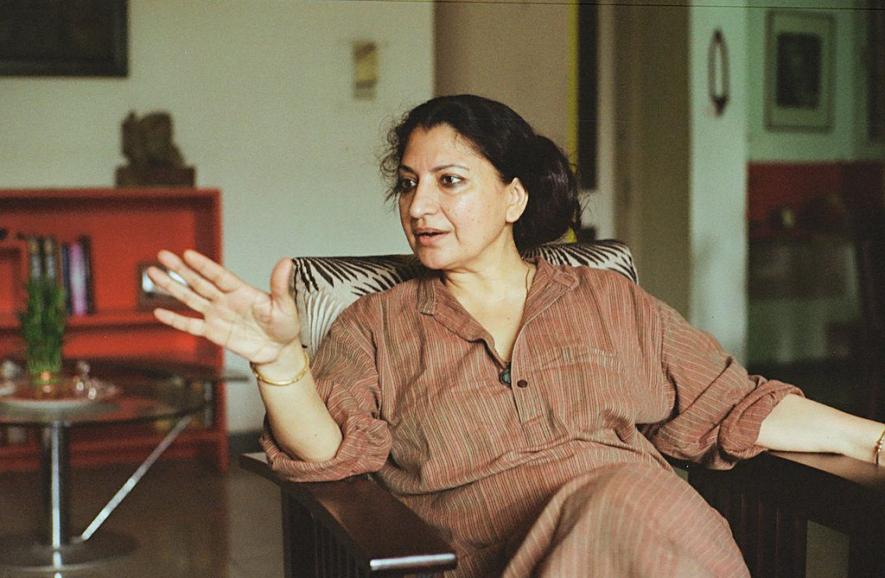
Image courtesy Flickr
Let me begin with my own location. My geographical locus is South Asia, India to be precise, North India to be more so. My mental locus is literature. In a manner of speaking that sums up my world. And in another manner of speaking it sets the entire vast world upon me!
Perhaps some essence of what I am saying can be captured by a walk down almost any street in India. An urban Indian street where the village and the town, and the East and the West, and animals — from the two-legged to the many-legged kind — mingle and jostle. A stinky gutter to the left. The refuse from it piled high and squiggling with worms, waiting for the municipality trucks to come and whisk it away. Before which the dust-laden, pollution-laden breeze will do it. It will not whisk it away, but right back into the gutter. And everywhere. On the road, an air-conditioned car playing high-quality Indian or Western classical music, if the driver is of a respectable age, and pop-quality Indian or western music if the age is carefree and wanton. Driving up to an ample and amply-gadgeted apartment, wholly unaware of the heat and dust just outside the door. More construction further up the street, for the better off and rich, by migrant workers from nearby or even far-off villages. They are living in tent like shelters made from left-over material like bricks and plastic sheets and tyres and rods and rubbish. In it they sit, crouched round a television set somehow procured and got going by pulling, twisting, possibly stealing wires and electricity and cable connection from nearby electric poles and houses. While their children play badminton with a discarded shuttlecock and discarded unmatched sandals for rackets. It is not by magic that these sandals can turn any moment into a knife or a pistol, or at least a tool not just to hit a shuttlecock. Alongside, on the fence, sit women, saris hitched up high on their thighs, unmindful of the supposed lure of the female body. And trudging past them, shopping bag in hand, middle class housewives covered from top to toe, like it’s a cold winter’s day on that hot summer street and also like it’s not mere body parts but gold and silver that they have tucked away in the folds of their clothes. The vegetable vendor shouting out an advertisement for his vegetables in a local dialect but with me using words, even sentences, in English, to let me know he too is educated and has dignity, so what if I am not and he is, a vegetable vendor.
These are ordinary stereotypical images, cascading one upon the other endlessly, creating a medley of sounds and sights and noise and colour. But it swamps me and it confronts me always with the question: who am I? And therefore, also, who are you and who are they?
That’s what variety does, inequity does, South Asia does. My humanity and yours percolated through a rich and vibrant but, also distressing miasma, and getting into just about anything and everything. Including literature.
This is the legacy we carry. At least since the national movement. A colonial experience and the birth of a new consciousness which made modern Indian literature the site for new issues. But also a site for protest, a site where identities and social relations and political assertions got expressed. But do I want, as a compulsory condition to the historical moment into which I am born, this membership to a protest movement? I am disturbed by this lack of distance between the ‘truth’ and me. Impelled by the need for solitude, the birthright of a writer and disturbed by the uneasiness of it in my society. Cursed by the realisation that I cannot be anything apart from my society. Desirous of a freer realm of imagination without this overpowering societal impingement. The writer in me worries.
That worry, however, pales into insignificance in the face of a bigger one. The emergence of an ethos which is gradually gaining power enough to direct and control events like never before. Recent developments in India bear this out. Gujarat, the text book controversy, the Simla Institute episode, the painting of Saraswati by Hussain, the stalling of Bhupen Khakkar’s exhibition for its explicit homosexuality, and just a few days ago an injunction that Indian girls may not wear the low-cut, waist revealing, hipster jeans in fashion today. An ethos more threatening because it is fast installing itself at the Centre. Among the biggest casualty in this growing rigidity and narrowness are social relations. State-sponsored wedges are driven between religious communities, as, for instance between Hindus and Muslims, and now, Christians too.
Here, I try and describe my attempts to make sense of these scenes around me by weaving in and out of my own creative efforts.
A reconstruction. A chronology. Some connected, unconnected narratives. A collage. And an I, not just me, but, we, incidental participants/observers/interveners in the trajectory and journey thus unfolding. The years 1989 and on, 1992 and on. Rathyatra in Gujarat. Kar Seva in Ayodhya. The ascendancy of Hindu political parties. Yet another conception of self rule, swaraj, the true nationalist. Riots. Demolition. Riots. Backlash. Riots. An edifice crumbles – the disputed structure. But more. A language. A facade. A morality. Generic term – secularism. It crumbles.
We, the educated middle class. In universities. In and around liberal professions. Shaken, arguing, researching. We speak and feel a loss of confidence at the repetitiveness and over-familiarity of what we are saying. Have these words, being used at least since the inception of the freedom struggle, outlived their value? And from around us, and even from our midst, other words. These also we have heard before, even all our lives, but, in tones more hushed and diffident than now. Secularism the big mistake. Secularism not secularism but, anti-Hindu, pro-Muslim. What’s happening had to happen. The wounded neglected majority had to burst out, scared and bound in their own nation, despite being the majority.
This tone is undermining ours. Its confidence is trashing ours. We feel a bit foolish, our words are ringing hollow. We use them still. Defensively. Aggressively. The true nationalist, the true Indian today is unmistakably Hindu and has found another ‘other’ – that’s us, the secularists, deracinated, rootless, nowhere. Far from us – we still think – in old parts of cities, among poorer and traditional sections of the people, there is a tension, there are killings, there is actual barbarism. Not amongst us, we still think. We talk. And talk and talk. We are safe, separate, civilised, we still think. But affected in our sensitive hearts and discerning minds. Upset. Wary. Beards are being shaved off, false names are being used in travels. Actually even from among our kind of safe, merely talking folk. We are talking of nothing else. Thinking of nothing else. Feeling disturbed, futile, hopeless.
Relatives speak with open anger – they wanted it we have given it, Pakistan, why are they still around to foment riots and trouble? A young medical intern visits us regularly. He is our friend. He will soon leave for the U.S. where he has a brilliant career assured. But you know, he says, we, the educated, shy away from it, but there is some truth in all this, they are so used to cutting and killing because of practices like halal and because they are butchers by profession that cruelty becomes part of their nature.
It does strike me to ask whether doctors, constantly cutting bodies and dipping their hands in blood, make better murderers. But our friend is gentle and kind and a vegetarian to boot!
I am a writer. My writing has come to a standstill. I cannot see the value of, or think of writing about anything else except this that’s going on. But I cannot write about this, for really, we know less about it now than we did till yesterday. When we felt we were on top and saw ourselves as the force of current times. Visionaries for the future. Unchallenged. Suddenly everything is challenged and everything is changing too fast around us – new tones, new colours, new voices, new visuals. Killings go on. Other atrocities too. And fiery speeches by ‘religious’ politicians. And a little idol of a Hindu god or goddess at this crossing or that, cordoning off a holy space, with a few coins strewn at its feet first, a prayer thaal and a diya next, a little platform soon and an enclosure and a roof… And a new temple has sprung up. One more. The townscape is changing fast. So much urgency in the air – which way are we going. So much confusion – what’s been right or wrong in our comprehension?
That gives me the cue. Confusion. Really that’s all I can write about. That’s all I am, we are, at that moment. A moment perhaps so fraught, so overwhelming, that the distance between thought and feeling shrinks, may be vanishes. If literature is about subtlety, understatement, deflections, detached observation, then can there be literature at such a moment? When the ‘outside’ turns so invasive that it is as if no ‘inside’, space remains for the writer? What is the writer without solitude? I don’t know. I can’t judge, though I might, when theirs leisure and time for literary debate say why not this kind of literature too, that there is no one kind of literature alone, the canvas of literature accommodates many modes, many transgressions and different times and different compulsions strain at the borders of different literary maps, reshaping them if need be.
Do I remember Premchand, our major early 20th century Hindi-Urdu writer, the man who adopted the concept of adarshonmukhi yatharthwad or realism, geared to an ideal as his preferred mode of writing. At a time when he felt informing/reforming society is of primary importance. He actually said that as a subject country, India cannot touch great heights of literature, for the highest is art for art’s sake, while we need to be didactic.
I do not think I agree about the highest art necessarily being that for art’s sake, or that subject India could not have it in it to make it. There is an inexorability about art as about age! It catches up! In all kinds of ambience. Premchand himself produced gems of literature. What does strike me though is the need felt by societies such as mine to address people directly, to express ‘outwards’ in a manner of speaking, the need compounded by the invasion of ‘outer’ events into the ‘inner’ lives of people. The shrinkage of ‘pure’ private space and its take-over by public space. To write when so invaded, to write with an inner censor worrying about implications, because everything is so immediate, so volatile, I am not sure how to deal with these factors.
I just stand, like many others, caught in the ‘moment’ which will not/cannot pass me by. I cannot wait for heart and mind to emerge clear and apart before I start writing. It is like being caught in a storm which has to be dealt with right there and then. Right here and now. An inevitability, an incumbency, an immediacy. But what sense can be made of scenes whipping around in a storm? Then leave that be, but record what you see flying around, quickly, it’s urgent, even without making sense maybe, to be able to make some sense in better, easier times maybe. A round object whizzed past. Make a note. Was it Krishna’s Sudarshan Chakra, a flying saucer, a javelin, a burning tyre? We’ll see if we can figure that out later. But record it now. As witness, not analyst, of this moment. In which continuities are cracking up, stories are turning upside down, clarities are clouded over.
That’s what I express. A collage of life around us. Ordinary. Absurd.
My novel Hamara Shahar Us Baras. A university area this side, a riot-torn city that side. We here, they there. Characters Hindu and Muslim and those who did not grow up defining themselves as either, trying to make sense of the trouble on that side, believing there are two sides, there and here, untouched by each other. They want to write, speak, understand. But are paralysed by the ‘storm’. The novel has four main characters. Two university professors, one Hindu, one Muslim. The Muslim has a Hindu wife, who is a writer. The Hindu professor is their landlord’s son. And the landlord is old man Daddu who loves to share an evening drink with them, in which time he makes their earnestness the butt of many a joke. These are people disturbed by events in the old city, the emergence of the math in the city. They want to write about it, talk about it, they even joke about it. But as the story moves on and they get further embroiled in all this, they just seem to lose more and more touch with what’s going on and with each other.
The form evolves as the subject unfolds. Continuities of routines and events constantly disrupted, unities of thought constantly dislocated, curfew today, bomb blast tomorrow, schools closed today, normalcy back tomorrow. A collage of unconnected, uneven, may be important, may be mundane, events together making the fabric of life of that city. Our City That Year. Silences between the broken narratives which are also narratives, pregnant, sinister, what… Changing landscape of the city, a gradual overlapping of them and us, a flow back and forth between there and here. Changing the mindscape of people, altering friendships, imbuing university politics, anything and everything, turning it into Hindu or Muslim. Slowly as the novel journeys on, turning answers into questions, creating riots and chasms of a kind on this safe, our side of the city too. Riots that have flared up under people’s skin, in their minds, are coursing through their blood. Their friendships, their interpersonal relationships, begin to get affected. Their sense of humour undergoes change. Beliefs they took for granted demand re-evaluation.
All this recorded hurriedly, haphazardly, by an ‘I’, an invisible unexplained copier who is nothing but a sense of urgency personified, who cannot wait to first understand, then write, for time is being lost and it may all go, just go, so just puts down on paper whatever comes in view, in whatever jumble, urgently and immediately. In sum the form the novel takes is as if an explosion has thrown bits and pieces of a ‘whole’ all around in a haphazard fashion.
And the end comes when Daddu is mobbed. The ‘noble’ old man in the novel who looked pretty much unconcerned about all that is going on and lived with his laughter and evening shots of whisky behind closed doors, teasing with affection these anxious people who, he says, have taken on the burden of the world on their shoulders. An aggressive, loutish mob at his door forces him to come out and in that encounter he ‘falls’, not so much from the push a hooligan gives him as from his own breaking into a tone, and a language of hysterical abuse and ugliness which his cultivated dignified self could never square with. It is the humiliation in this fall that destroys him, a fall brought about by the take-over of his space and culture by this mob. Daddu retires into a silence, which hangs like a metaphor over the entire novel.
The novel solves nothing. No matter. That’s probably not its role. It does, however, with small details and occurrences in the daily life of the characters in that city, show a gradual breakdown of the lives and unities they had built up. It compels its characters, Hindu and Muslim to so define themselves, over and above their other identities, in that city – which is not just one city – in that year, which is not just one year.
But the novel does something else too. In writing it and despairing over the new twists and turns confronting us, I nonetheless feel reaffirmed in what we lived by and believed in. It still stands and in spite of everything that does happen, the characters do not capitulate to a monochromatising of identity, national or individual.
For me this is an important effect of the writing of Hamara Shahar Us Baras. Our reasoning needs reworking, but what we feel is valid. Our faith stands through all the confusion, all the shaking up of our dogmas, and intuitively so.
Some years pass. There is a break in time. Not really. The loud and confident language of the new religious is now a part of the north Indian mainstream, at any rate, more than ever before. But life has acquired a semblance of law and order.
January 2002. We are in Ahmedabad. Kite flying season. It’s full of gaiety and amusement and celebrated widely. A mix of old and new – disco music, alcohol, traditional gur snacks, sari clad housewives and jeans, and jacket clad youngsters all on the roofs. Of old houses in old mohallas with terraces upon terraces joined like a city unfurling under the skies.
A sky of kites. Made and sold by local Muslim craftsmen. Some fancy high tech ones brought and bought from western European countries too. All shouting, laughing, flying kites. Sometimes hanging on to their mobile phones in one hand!
It does not occur to us to look at the skyline and fix it permanently in our mind’s eye because a month later it is going to be different. Who of these women, men, which of these roofs, we cannot be blamed for not wondering, will be charred remains and that’s all?
But may be we should be blamed for not wondering. Post facto we can see that we could and should have seen it coming. Modi and his brigand. RSS, VHP. Dalits out on the rampage. There has been committed preparation going on. Waiting for a spark.
Terrible Godhra happens and the pogrom list long prepared and ready is acted upon. Terrible Gujarat happens. Mobs are set loose in supposedly spontaneous avenging fury. The State’s law and order machinery is not on duty and when is, it looks the other way.
We live part of the year in Gujarat but are in Delhi just then. We hear and see our first televised live riots. A new machismo. Jean clad youth on two wheelers holding aloft tridents and swords and posing with pride for photographers, delighted to appear on front pages, and be seen and recognised by the world. Really sure of the rightness of their cause? And method?
Relatives speak to us. For once we agree with you, what the Hindus are doing in Gujarat is terrible but, you know something, had it been Muslims doing it, no one from their community would be expressing regret and shame like us.
Relatives are not outsiders. Not the illusory them on that side of the city. They are us and here
We go to Gujarat. Ahmedabad. Baroda. Godhra. I can’t really imagine what it is like to be a Muslim in this India but I don’t feel entirely removed from the experience either. As a woman, a secularist. It sounds like a joke but my husband has a beard and so we are taken to some areas under police protection and in the company of a leading Gandhian.
The few privileged, elitist, educated Muslims, many our friends, have left the city, refusing to live the psychology of victims but, the refusal is a bit specious, isn’t it, and has changed their smiles. The majority of Muslim survivors are in camps. Insect colonies I think when I see them. Which explains also our desensitisation to their plight – the lower and lower middle class clusters who anyway live huddled together in hovels and slums and shanty towns, and look only half human to us.
The Hindu areas of Ahmedabad live with much of that desensitisation still – Americanised young on mopeds, loud music, fast food parlours, shopping glitter, unaware or uncaring or unbelieving of the different scenes in areas adjoining theirs.
We go to Naroda Patiya, one of the worst attacked areas. Black remains, like after a nuclear holocaust I imagine. That’s as far as my imagination goes. I cannot imagine the people who ran from here or could not, from the display of avant-garde sculptures of black, smoked, smelted, mangled two wheelers and three wheelers, fans, furniture, refrigerators, cupboards, chests, dishes, what not. I cannot imagine, however much I try, what it is to be one of the women dragged out and gang-raped in the open lane where broken bangles lie strewn. I notice I am walking ridiculously, on tiptoe, to avoid getting the ash on my feet or avoid touching down with my shoes on what might have been I dare not imagine what or who? To avoid polluting myself or to avoid trespassing on someone… something…
We also go to Godhra where the hapless carriage stands as a monument of grief for all who wish to make the pilgrimage. We look at all the suspicious evidence of it and many of us step down convinced the burning of this carriage was a ploy of the Hindus. At that very same moment some others step down from the other door and are heard saying to each other they should bring all secularists and Muslims here, and show them this to straighten out their brains!
Are we not in tune with the people?
What is it that we are missing? Not catching?
We return to Delhi. I speak at some meetings. Of how we stood in a red-walled temple to Hullaria Hanuman that means riotous Hanuman, in what was once a Muslim’s kebab shop with white walls. Its one of the many Hillarie Hangman temples that have sprung up overnight in Gujarat, giving this new attribute to the god. The mazaar of Faiyaz Khan, the greatest musician of our times, was desecrated. That of Wali Deccani, a major poet representing composite culture, was destroyed and overnight became part of the paved road on which traffic vehicles roar past. A slightly coarsened texture in the road showing that’s where once it was, where Wali still lies. Enter Gujarat and signs greet you – welcome to the Hindu nation. Kathas and kirtans all night on loudspeakers, sky-high idols of gods and goddesses, temples galore, are fast becoming our environment in far off Delhi too, all marking fresh Hindu fervour. And non-aggressive but increasingly more confident well-to-do Hindu daughters in law and mothers in law, in resplendent silk saris and carrying pooja thalis, followed in tow by their tika-wearing menfolk, block and divert traffic on roads for aarti processions, on hitherto little known holy days.
Some friends are enraged – so what’s wrong with beautiful rituals that the faithful do? And a few days in Gujarat and you speak like you are experts on everything. It’s not a few days, we say, but, a few more days in Gujarat and India showing us a changed environment, a loud, garish, larger than life audio-visual effect all around which we did not have before.
Friends are not aliens, they are not the illusory them on that side of the city. Them are us.
We are depressed, even powerless, and its little consolation to know that what’s happening in India is a microcosm of what’s happening elsewhere in the world by forces unleashed by globalisation. Nor does it comfort our daily existence that the breakdown of barriers – which we welcome – is why there is this need for a re-erection of barriers.
I am a writer. Our collective mood translates itself into a story. A story about two friends in these turbulent times, one Hindu the other Muslim, and while the Hindu friend sits waiting in the veranda of his Muslim friend’s house, making himself as visible as possible to keep attention from being directed to his friend, the Muslim sneaks in like a shadow and a thief into his own house from the back door, to take out some belongings he could not, when he left in a hurry and now the house may well be burnt in the kind of riotous fury that’s raging in the city.
The times, the writing go on. The pressures of it. The despair and hope of it…
Author’s note:
I wrote this in 2003. Mulling over the anxieties of being a writer in a time when the environment loomed large and overbearing on almost every moment of our lives. Since then, that intrusion and pressure has only worsened. The overlapping of the private and public, and the personal and political, oppresses an even larger part of the world today. How do we negotiate is the question.
Originally published on March 27, 2017.
Republished on occasion of the author winning the International Booker Prize 2022 for her novel Tomb of Sand, originally published in Hindi as Ret Samadhi and translated into English by Daisy Rockwell.
Get the latest reports & analysis with people's perspective on Protests, movements & deep analytical videos, discussions of the current affairs in your Telegram app. Subscribe to NewsClick's Telegram channel & get Real-Time updates on stories, as they get published on our website.















